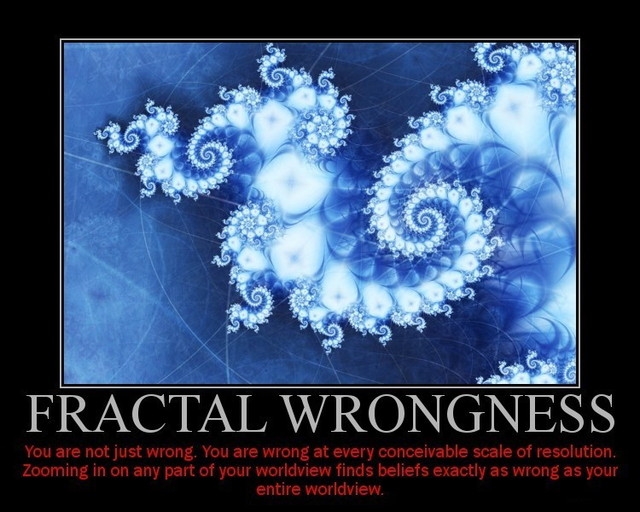August 2011
This Month's Contents: Upon Reading the July TAT Forum by William Racine | O Mountain of Me by Isaac Hill | Is the World an Illusion? by Art Ticknor | Quotes | Humor | Reader Commentary | Your Question of the Month
Editor's Note
by Shawn Nevins
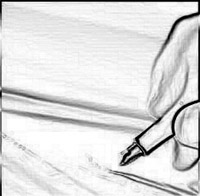 With the introduction of the "Question of the Month" feature, reader commentary continues to be unusually high. In fact, this month's lead essay is a particularly well-written piece of reader commentary. David and I enjoy your feedback and participation as we fumble about each month assembling these bits of poetry, prose, and photos, buoyed by the thought that it is in some way helpful.
With the introduction of the "Question of the Month" feature, reader commentary continues to be unusually high. In fact, this month's lead essay is a particularly well-written piece of reader commentary. David and I enjoy your feedback and participation as we fumble about each month assembling these bits of poetry, prose, and photos, buoyed by the thought that it is in some way helpful.
Upon Reading the July TAT Forum
by William Racine
Upon reading the July TAT Forum, it seems most of the respondents missed the point of the question, "What does Truth feel like?" which I take as a prod to examine the ineffable, but more than this, I note how readily most simply put forward concepts. I am particularly struck by Greg Nicholls’ essay: Mr. Nicholls apparently feels quite comfortable telling the reader that, “There is no road, no path, to Truth.” Well, I originally became a practitioner of the Albigen System because Richard Rose transmitted to me the conviction that there IS a path to Truth, and that path is, “Commit your life to finding Enlightenment by BECOMING Truth.” Rose wrote several books and spent years as a teacher in order to guide seekers upon the path.
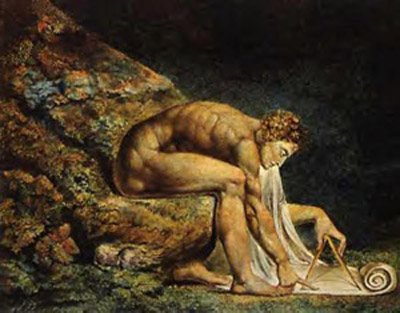
Mr. Nicholls declares that, “There is no ultimate experience to be gathered up and used as a shield against the human condition of relentless incompleteness." I don't know about anything being used as a shield, but it is the foundational premise of the TAT Society that there is, in fact, an ultimate experience.
Others write, ”you reveal an ego yet to transform itself from seeker to one who has become humble in the knowledge that God actually exists and is beyond your trying to figure it out.” Why then did Jesus say, “Seek and ye shall find?” In terms of the request, how about this: "you have a soul separate from your psyche, mind, emotions, zen, buddha, yoga, etc." Here is nothing more than a string of words, of concepts. "God is separate from you and you are his creation.” Hmm ... in the Gospel of John, chapter 14, verse 20, Jesus says, "When you know the Truth, you will know that, just as The Father and I are within each other, you and I are within each other."
I will define Truth, in this writing, as synonymous with Being. The only meaningful questions in the pursuit of Enlightenment are, what is the nature of myself and what is my relationship to everything else? Far too many who position themselves as teachers are quick to answer those questions by declaring, “The seeker is an illusion. Self is an illusion.” To which I ask, who is it that observes this illusory state?
Enlightenment is real, it is possible, and it is worth the journey. Richard Rose became a teacher because he observed that the world of spiritual seeking is filled with those who are posing as authorities without having the goods. But he scrupulously avoided passing out concepts. He was very clear in saying the purpose of The Albigen Papers is to be a caustic, to strip away all the concepts.
Attaining silent mind is a good plateau on the journey to Absolute realization. It seats one in the position of Observer. But this is still not the pinnacle, for beyond lies the Awareness that IS, beyond, or perhaps it is better to say, before the observer and the observed, before form, beyond conception, Absolute and Eternal, where eternity has no meaning and infinity is immediate.
The paradox is this: reality is but it is not, the self is real but it is not, both are true but neither is Truth. The struggles of living do not suddenly evaporate, but they are seen for what they are, and one lives the paradox. And it is both glorious and terrible. “Life may be an illusion, but if you get hit by a bus that illusion will hurt a lot.”
O Mountain of Me
by Isaac Hill
|
there is just or being the space is moving or the figure is not surroundings, there & there is a mountain or sins, tendencies & I might be or I might be or both end the journey at the end of O
|
Is the World an Illusion?
by Art Ticknor
In his extensive introduction to The Divine Life, Swami Yatiswarananda of the Sri Ramakrishna organization gave the following synopsis of the Vedantic views of God and the world:
According to Vedanta, the highest expression of spiritual knowledge in Hindu culture, there are three points of view from which God's relationship with the world can be discussed. In dualism god is personal and extra-cosmic, and the universe, like a machine or a pot, made out of self-existent materials called atoms. This may be called the theory of atomic agglomeration. In what is known as qualified non-dualism, God is personal-impersonal and immanent in Nature. Here, therefore, the universe is looked upon as an Organism. It is real and passes through gross and subtle states in a cyclic order. This is the theory of evolution and involution. In the third point of view known as non-dualism or monism, the Divine who is really impersonal and transcendent appears as the universe through the power of Maya or delusive and creative ignorance, which, with its limitations of time, space and causation, forms, as it were, the matrix of matter and mind. This appearance is taken to be real, as long as the soul is in ignorance, but it is realised to be unreal with the dawn of true knowledge, which reveals the nature of Reality.
The question of what's real falls into the realm of ultimate knowledge, and India has historically produced the largest body of literature about such knowing. But the Vedantic teaching, as summarized above, doesn't provide a definitive answer. So let's take a look at our first-hand experience. The waking-state world appears as terrifically solid as well as amazingly complex and consistently commensurate despite being replete with contradictions and paradox. And yet what do we really know about it? All our impressions come through limited sensory channels, with the percepts that don't get filtered out of attention then being interpreted through memory-association and training. What we "know" are the percepts and concepts that form in our consciousness. About the world itself we know nothing directly. The percepts and their interpretation can be drastically affected by anything that affects the electrochemical operation of our neural system. As an extreme example, we have the testimony of those people who have ingested hallucinogenic substances. Even in everyday experience our hormone-producing glands and our emotional states interact to alter our perceptions and reactions. When we get right down to it, there's no steady baseline we can use to determine a correct interpretation of our perceptions.
And then we have the dream world, which is every bit as convincing when we're dreaming as the waking world is when we're awake, and yet it operates under a different set of rules. I had a dream a while back in which I was walking rapidly through a desolate landscape, watching the terrain at my feet. I descended a gravelly path skirting a small hill, and behind me I heard the voice of a friend, KP, saying to other unseen people, "There goes a [some positive adjective, which I didn't recall exactly] man" and then something about: "I've got to go see him."
His tone was enthusiastic, sounding like he was happy to have spotted me. I heard him running to catch up with me as I kept walking. When he neared, he started to go around me in order to get in front of me — i.e., to face me — and I said to him, "You could have just gone through me" (rather than around me, since I'm not solid).
This made perfect sense to me in the dream, where otherwise-opaque walls can be seen through or even walked through. I knew that what my friend saw was actually a projection of his mind. How could that be solid? Why did he walk around it? The projection ("my body") didn't prevent it. It must have been some belief he maintained.
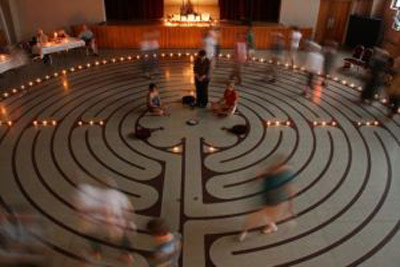
The physicist and astronomer James Jeans wrote way back in the 1930s: "... The universe begins to look more like a great thought than like a machine. Mind no longer appears to be an accidental intruder into the realm of matter ... we ought rather hail it as the creator and governor of the realm of matter." By the 1990s, particle physicists were collecting more and more evidence in line with the Jeans view. The findings were described in Michael Talbot's popular Holographic Universe, which conveyed the conclusions of David Bohm and others that despite its apparent solidity, the universe was actually a hologram or mental projection. But let's get back to our first-hand experience.
What happens to the waking-state world when we fall asleep? Based on personal evidence, it disappears when we disappear into sleep and reappears when we awake. If we ask our friends and family, they may testify that the world still existed while we slept — but those folks are parts of the world in question, so that means we would be taking the world's testimony as to its independent existence.
The world appears to be outside, appears to have dimensionality and substantiality, appears to be composed of an endless list of irreconcilable opposites such as up and down, coming and going, before and after, birth and death, and so on. But when we investigate a bit, we realize that we perceive the world on an interior viewing screen — like a movie theater in the mind — and the mind somehow projects those TV images to appear outside. How then can we know anything certain about its reality?
A hologram exists and is real in that sense. But if we assume it to be solid, we find that our interpretation is faulty. Similarly, the mirage that we "see" of a puddle in the road or an oasis in the desert exists, but the puddle or oasis may not. If we can splash the puddle or find shade and water in the oasis, we say that they're real. But if we then awake and realize they were convincingly real in the dream world, we say they weren't real after all.
Questioning the world's reality or illusionism puts us in the philosophical domain of epistemology, the nature of knowing, where we encounter the sickening spin of looking for certainty in the mind. If you and another object are alone in space and the other object is getting closer, how can you determine whether you're moving? You only know your position relative to that of another object, which may or may not be moving. In order to know for sure whether you're moving, you would need to have an absolutely still point of reference. In the same way, in order to know with certainty whether something is real or illusory, you would need to have an absolutely real point of reference. If there were an absolutely still point of reference, or an absolutely real point of reference, how would you know it? In order to know it, you would have to become it.
What an absurd possibility! Or is it?
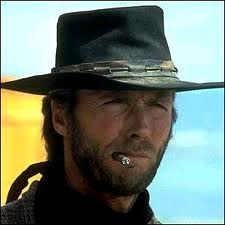
|
Quotes...."It's what people know about themselves that makes them afraid." ~ Clint Eastwood in High Plains Drifter
|
Humor....
Reader Commentary
Friends, I love reading the forum as it provides me endless moments of
either laughing out loud or wanting to toss my computer in the trash.
Regarding the search for truth: you have to stop giving a s..t about
it! You must say F..k reality! You must give it all up! Reality
doesn't give a s..t about you! It is not trying to find you, wringing
its hands and writing poetry about your condition. It's all too
f..king bad as far as Reality is concerned. All the questions reveal
how very far reality apparently remains. I might suggest that this
so-called search is a function of modern man who has too much time on
his hands and not enough meaningful action to be undertaken. You have
to give it all up!
~ M.D.
And...
Your Question of the Month:
July's question, "What one question would you ask of your own most respected authority on metaphysics?" provides this month's:
Why seek?
~submitted by T.S.
Did you enjoy the Forum? Then buy the book!
Beyond Mind, Beyond Death
is available at Amazon.com.



